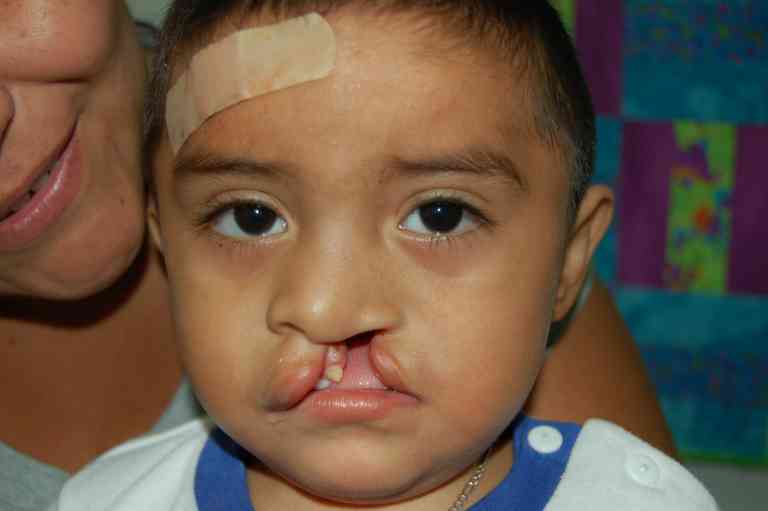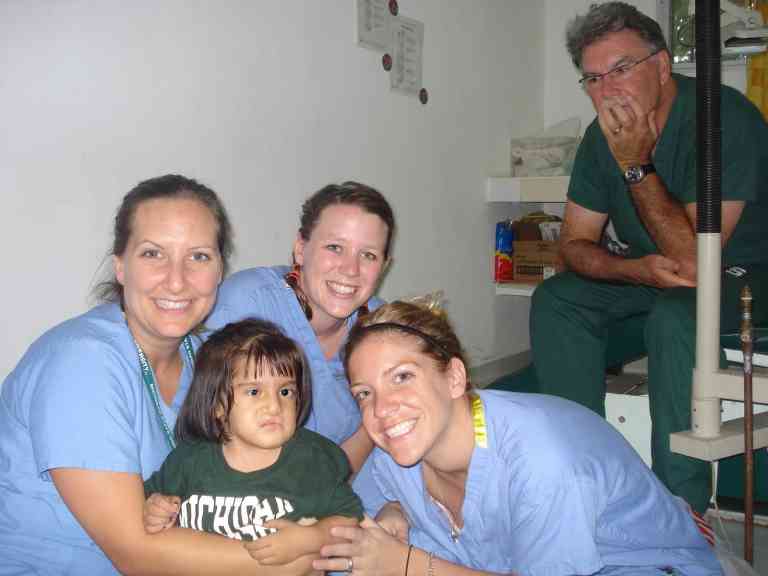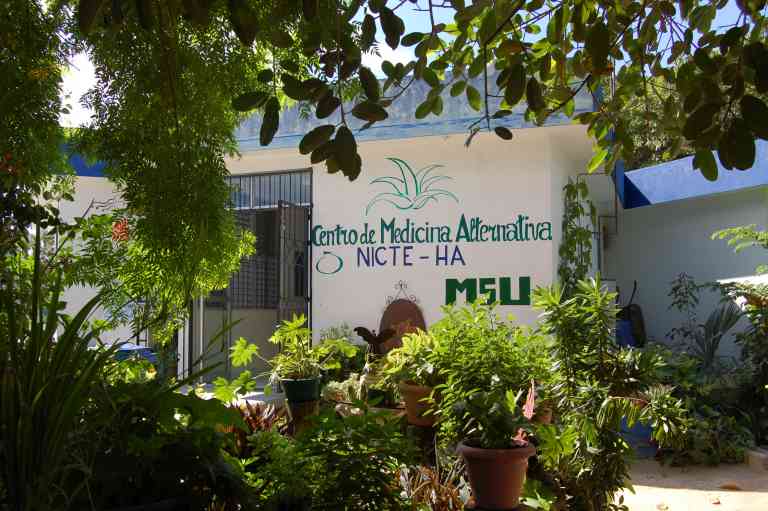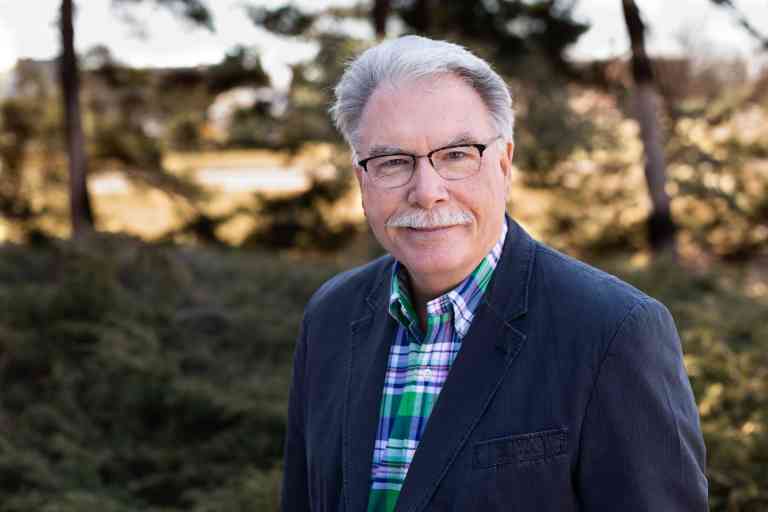Ask Professor Peter LaPine, Ph.D., what it’s like to teach for more than 35 years, and he’ll compare it to house paint.
“It’s like painting your house,” said LaPine. “You start out with a plan, and when you’re finished, assuming you picked good paint, it looks pretty good.”
What may seem like a strange answer, at first, becomes a window into LaPine’s teaching style and the artistic approach he takes to educating students. Since 1984, LaPine has worked as an educator, researcher and leader in the Department of Communicative Sciences and Disorders at Michigan State University. In March, he will receive the MSHA Distinguished Service Award for his work.
“For me, the classroom is like the canvas,” said LaPine. “That’s the place where I have the most fun.”
This Spartan is known for his modesty and his unique sense of humor. With a M.A. from Northern Michigan University, LaPine earned both his B.A. and Ph.D. in Audiology and Speech Sciences from MSU, and he couldn’t imagine teaching anywhere else.
Repairing Cleft Lip in Underserved Communities
If LaPine were to name a focus of his career, he would point to communicative disorders in adults, specifically head-and-neck cancer voice restoration or aphasia, which robs people of the ability to communicate. But he goes where he is needed, a quality that’s led him across the globe, from Bulgaria and the U.K. to Mexico.
LaPine has practiced locally, working at Michigan Ear, Nose and Throat since 1989, and he’s devoted many years to repairing cleft lip and cleft palate for underserved populations in Central and South America. He’s traveled to Mexico and Peru, using grant funding from Ransom Fidelity Foundation and others to lead humanitarian projects focused on medical intervention and education.
“I went once, and I discovered that the demand was absolutely overwhelming,” said LaPine.

A child in Mexico comes to Dr. Peter LaPine and his team for help with a cleft palate malformation
With graduate students and other medical professionals on the team, they screened hundreds of children for speech, language and hearing and conducted restorative surgeries in primitive settings.
“The oral cleft is a malformation, but it may affect eating and nutrition. The obvious need just sort of spoke to me,” said LaPine. “Clefts are either genetic or environmental. If the parent passes the gene, that, in gestation, causes an anomaly that creates the cleft. Camargo was an agronomous community that was just full of farms. Everything was just filled with environmental waste from pesticides and insecticides.”
Runoff from the farms trickled into the water supply, and due to unsafe storage, toxic chemicals leached into the drinking water. The result was numerous malformations in children and adults that went untreated. LaPine recalls a time when they did 700 screenings in one week and completed more than 80 surgeries, encountering 10, 20 or 30 unrepaired cleft lips and cleft palates in one day.
“That was Camargo, Mexico, where when it rains, the tarantulas come out of the ground!” said LaPine. “Then I was hooked. They just had such demand. In Ingham County, I’ve seen one unrepaired cleft in my lifetime.”
Graduate students, and even some undergrads working as translators, accompanied LaPine on the trips, taking advantage of a rare opportunity to work in speech-language pathology across the border.
“They grew. That was it. They became more confident. They made better clinical decisions. If they made a bad decision, they were able to think it through and amend it,” said LaPine. “We did make people better. We made the students better communicators, but the experience made them better people.”

Dr. Peter LaPine watches as a group of MSU medical students gather with a child undergoing a cleft procedure.
Empowering Future Practitioners
The true testament to his life’s work is reflected in LaPine’s students.
Among them, Teresa Lyden, M.A., CCC-SLP, used her master’s degree from MSU to become the lead head and neck speech-language pathologist at Michigan Medicine, working for the University of Michigan.
“I truly enjoyed his style of teaching,” said Lyden. “He was charismatic and funny. He always had a story to tell that related to what he was teaching.”
The stories LaPine told often served a purpose. They were lined with vivid details and comedy, making LaPine a favorite professor for many of his students.
“He provided the necessary information with real-life application," said Lyden. "At the end of the term at MSU, you had a notebook full of practical material that could be easily used in a clinical setting.”
LaPine continues to be a resource for his students long after graduation. He offers invaluable connections in the field, and recommends qualified students for internships or other programs. His students know he is there to guide them and offer advice on their clinical cases or career paths.
“Early in my career as a young SLP and when faced with a clinical ‘dilemma’ related to a head and neck cancer patient, I would reach out to Peter and ask him for assistance in managing the care of the patient,” said Lyden. “He was always willing to listen and to provide clinical guidance. He never made me feel inferior as a clinician. Nor did he ever turn me away.”
Looking back, Lyden is amazed by how much she learned from LaPine.
“I did not realize it at the time, however, he was teaching me during these interactions. Peter taught me how to think through the options for clinical management of a situation and then how to implement these potential ‘fixes’ so that I could achieve the desired outcome,” said Lyden. “His gift to me was that he did not just give me the answer to my question. Instead, he provided guidance while allowing me to think through and subsequently come up with a solution to these challenging clinical situations."

A clinic in Mexico offers health care with the help of students and practitioners from MSU.
A Lasting Impact
Making a lasting impact on the field, LaPine has served in many leadership positions and volunteer roles. He is a core faculty member in the Center for Latin American and Caribbean Studies and a member of the Vocal Health Team in the College of Music.
He taught as an adjunct professor in the Department of Physical Medicine and Rehabilitation and in the College of Osteopathic Medicine for the MSU Institute of Global Health. He also held a number of academic appointments, including Program Director, Director of Graduate Admissions and Clinical Director.
“He’s really humble, but he’s really done outstanding things for the department,” said Gregory Spray, M.A., CCC-SLP, a former student who is now the president-elect for MSHA. “You could say he’s the heart and soul of the department.”
Spray was involved in the nomination for LaPine, who will receive one of the two highest honors offered by the association.
“It was really hard to pinpoint a specific contribution, because there’s been so many,” said Spray. “We focused on the international scope of his work.”
MSHA will present the Distinguished Service Award to LaPine for his international service during the awards ceremony with a reception to follow. Over 17 years, he created and directed 62 humanitarian projects in the Yucatán Peninsula, leading graduate students through medical and educational experiences in rural areas of Mexico.
“Apart from Peter being an incredibly kind and caring human being, he is an outstanding educator that has continually gone above and beyond,” said Lyden. “To value his contributions to our profession over the years, all you have to do is look to the countless number of successful speech pathologists that he has helped throughout their academic and or professional careers.”
By Melissa Priebe
